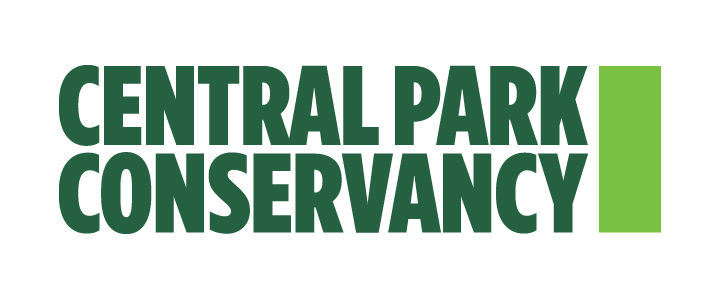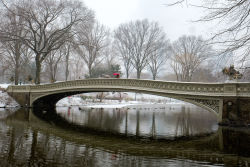Central Park
The Daily Plant : Wednesday, April 18, 2001
NRG REDUCES NON-POINT SOURCE POLLUTION AND RESTORES FORESTS IN NORTHERN MANHATTAN
The Natural Resources Group (NRG) has received more than $2 million dollars from the New York State Clean Water/Clean Air Bond Act, the National Fish and Wildlife Foundation and the Environmental Protection Agency for non-point source pollution reduction and forest restoration in northern Manhattan parks. Years of erosion have threatened the root systems of many trees on steep, forested slopes in northern Manhattan, destabilizing them and leaving them prone to falling down in heavy winds or dying. Eroding soils end up in the Hudson River. This sediment pollutes the river by degrading water quality and reducing oxygen levels. The result is that fish such as the blueback herring, American shad, American eel, and striped bass are harmed, and the entire Hudson River ecosystem damaged.
Erosion is compounded in northern Manhattan parks by off-trail use and the proliferation of exotic, non-native vegetation. Years of misuse by hikers and bikers have caused soils on steep hillslopes to become compacted. Plant roots cannot penetrate compacted soils and thus slopes remain bare of vegetation and vulnerable to erosion caused by rain. A grant from the Hudson River Improvement Fund will help NRG produce signs and brochures to educate the public about erosion and appropriate uses of parkland.
Invasive species planted by previous landowners or introduced by wildlife also encourage erosion. Exotics such as Norway maple (Acer platanoides) and Tatarian honeysuckle (Lonicera tatarica) provide very dense shade and allow little light to penetrate to the ground. Because of this lack of light, few native plants and trees are able to germinate and grow in forests where these trees and shrubs dominate. A lack of vegetation makes the slopes containing these exotics vulnerable to erosion because there are not enough different types of plant roots to hold the soil.
In order to save native trees in northern Manhattan forests and prevent further erosion and sedimentation of the Hudson River, NRG has been removing non-native, exotic trees, shrubs, and vines and replanting with trees, shrubs, and groundcovers that are naturally found in this area. These plantings help re-create healthy, intact forests where trees, shrubs, and plants work with each other to hold soil in place. Native vegetation also provides better habitat and food for passing and resident wildlife in the parks.
In 2000, the NRG forest restoration team for northern Manhattan concentrated our efforts in Inwood Hill Park. Over 2.5 acres of forest were stripped of invasive species and replanted with native vegetation. 20 acres of forest were swept for isolated invasive vines and shrubs, and 5,130 native trees and shrubs were planted. The forest restoration team and volunteers installed 3,000 square feet of erosion fabric above the Hudson and Harlem Rivers and planted 4,686 native wildflowers and grasses to retain soil.
This year, NRG plans to continue restoration work in Inwood Hill Park. As part of our efforts, a steep, eroding forested slope above the Hudson River will be hydroseeded with a mixture of native grasses and wildflowers to prevent further erosion. A large, forested slope in Riverside Park between 88th and 85th streets will also be restored this year with New York State Bond Act money. Invasive maples will be removed, slopes will be stabilized with a variety of bioengineering materials, and over 600 trees and shrubs and 10,000 wildflowers will be planted. Six volunteer days are scheduled this spring in Inwood Hill Park for erosion control, tree and shrub planting and wildflower planting. For information on how to volunteer, please call 212-304-2365.
By Cheryl (True Frog) Nenn, NRG Forest Restoration Team
PARKS TREE EXPERTS
Congratulations to Brian Liberti, Manhattan Supervisor of Street Tree Planting, who recently passed the certified arborist exam offered by the International Society of Arboriculture. ISA certifies arborists with at least three years experience in the field. They offer a three-hour multiple-choice test with questions in thirteen sections from tree identification to pruning techniques. Through their rigorous exam, the society maintains a standard for arborists worldwide. Brian joins four other certified arborists at Parks: Fiona (Treetop) Watt, Chief of Central Forestry; Doug (Slugfest) Still, Assistant Director of Street Trees; Tom (Tree Guy) Stofka, Director of Forestry Brooklyn; and Tom (Timber Wolf) Russo, Director of Landscape Management Queens.
Since his arrival at Parks in May 2000, Brian has overseen the planting of over 1,000 trees in Manhattan. He responds to requests for new trees from community boards, council members, borough presidents, and private citizens. In analyzing the biological and aesthetic condition of a proposed site, he considers the space above and below ground, the light conditions, and the size and species of neighboring trees. Based on these factors, he determines which trees and how many should be planted. Brian also facilitates communication with the private companies that plant street trees. He visits young trees in the nursery, tags them, and inspects them after they've been planted. Currently, there is a six-month period between when a request is issued and the new tree planted, a quarter of what it was in 1996.
THIRTEEN YEARS AGO IN THE PLANT
(Wednesday, April 27, 1988)
HAPPY BIRTHDAY, OLMSTED!
In an authentic Victorian interior of the restored Central Park Dairy, Commissioner Stern and Central Park Administrator Elizabeth Barlow Rogers and 60 schoolchildren from P.S. 183 yesterday celebrated the 166th birthday of Frederick Law Olmsted, the designer of Central Park, Prospect Park and other landscape masterpieces in New York City and around the nation.
Dressed as Olmsted, Joe Killian, Director of the Summerstage performances series in Central Park, was entertained by the students from P.S. 183 in Victorian costume.
QUOTATION FOR THE DAY
"But if the while I think on thee, dear friend,
All losses are restored and sorrows end."
William Shakespeare (1564-1616)
Check out your park's Vital Signs
Clean & Safe
Green & Resilient
Empowered & Engaged Users
Share your feedback or learn more about how this park is part of a
Vital Park System
Contacts
Central Park Information: (212) 310-6600
Central Park Information (for the Hearing Impaired): (800) 281-5722
Belvedere Castle, The Henry Luce Nature Observatory: (212) 772-0210
The Charles A. Dana Discovery Center: (212) 860-1370
The Dairy Visitor Center and Gift Shop: (212) 794-6564
North Meadow Recreation Center: (212) 348-4867
Loeb Boathouse (Bike rentals, boat rentals & gondolas): (212) 517-2233
Carousel: (212) 879-0244
Fishing at Harlem Meer (Catch & Release): (212) 860-1370
Harlem Meer Performance Festival: (212) 860-1370
Horseback Riding - Claremont Stables: (212) 724-5100
Metropolitan Opera (Performances on the Great Lawn): (212) 362-6000
New York Philharmonic (Performances on the Great Lawn): (212) 875-5709
Shakespeare in the Park - The Public Theater at the Delacorte Theater: (212) 539-8655
Central Park SummerStage: (212) 360-2777
Swedish Cottage Marionette Theater: (212) 988-9093
Tennis: (212) 280-0205
Weddings, Ceremonies and Photography at the Conservatory Garden: (212) 360-2766
Wildlife Center & Tisch Children's Zoo: (212) 439-6500











